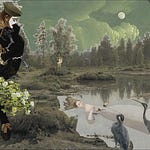XXXII. VIOLON DE LUNEO Pierrot ! Le ressort du rire, Entre mes dents je l’ai cassé : Le clair décor s’est effacé Dans un mirage à la Shakespeare.
Au mât de mon triste navire Un pavillon noir est hissé : O Pierrot! Le ressort du rire, Entre mes dents je l’ai cassé.
Quand me rendras-tu, porte-lyre, Guérisseur de l’esprit blessé, Neige adorable du passé, Face de Lune, blanc messire, O Pierrot! le ressort du rire?
XXX. CROSSES Beautiful poems are tall crosses on which red poets are drained of blood, blinded by bone-eating vultures that fly like terrors.
To gladiators’ swords the cold cadavers have offered scarlet feasts: beautiful poems are tall crosses where red poets are drained of blood.
When will you give me back, lyre-bearer, quacksalver of the wounded mind, venerable snow of yesteryear, Moon-face, white milord, O Pierrot!—laughter’s steel spring?
NOTES (by line number, starting with the title).
1 In Rondels à la Lune, where it has the same title, this is rondel VII.
SUPPLIQUE : This, the last of five consecutive rondels with religious themes, gets quite technical. [Note to be expanded soon.\
2 le ressort de rire : DAf1878 distinguishes two identically spelled nouns « ressort », the first derived from the second but different enough to be a word in its own right: (I) « Étendue de juridiction », ‘Extent of jurisdiction’, and (II) « T. de Physiq. La propriété par laquelle certains corps pressés, pliés ou tendus se rétablissent d’eux-mêmes dans leur premier état […] aussi, Un morceau de [...] acier ou d’autre matière, qui est fait et posé de façon qu’il se rétablit dans sa première situation, quand il cesse d’être comprimé », ‘Term of Physics. The property by which certain bodies when compressed, bent, or stretched, restore themselves to their initial state […] also, A piece of [...] steel or other material, fabricated and situated in such a manner that it restores itself to its initial position when it ceases to be subjected to [external] force’; i.e., a spring. I assume Giraud is deliberately equivocating between « ressort » (I) and « ressort » (II).
5 Shakespeare : In Héros et Pierrots, the spelling is Shakspeare.
6 Au mât : In XXV.12, an implicature of the phrasing « À son grand mât », ‘On her main-mast’, was that the « blanc vaisseau » has at least two masts (else « grand » would be redundant—a deduction from the fact that « grand mât » is a single lexical item, rather than a noun phrase in which the adjective « grand » modifies the noun « mât »). A similar, weaker implicature of this rondel’s phrasing « Au mât », ‘On the mast’, is that the « triste navire » has just one mast.
7 pavillon : See XXV.13.
10 porte-lyre : Literally, ‘lyre-carrier’. Delvau’s Dictionnaire de la langue verte (Paris, Marpon & Flammarion, 1883) defines it thus: « Porte-lyre, s. m. Poète, — dans l’argot ironique des gens de lettres », ‘Lyre-carrier, n.m., Poet, — in the ironic argot of men of letters.’ It would seem reasonable to assume this is derived from some classical epithet for Apollo (inventor of the lyre) or perhaps for Orpheus (the lyre’s best known mortal player), but I have found no citation to support that hypothesis earlier (or more explicit) than Remy de Gourmont’s observation in La culture des idées [etc.] (Paris, Société du Mercure de France, 1900, p. 195) that « Apollon porte-lyre revit en sainte Cécile », ‘Apollo the lyre-carrier lives again in [the person of] St. Cecilia’.
11 Guérisseur : First defined in DAf1878 : « Qui guérit, qui fait profession de guérir. [...] Un médecin peu instruit, [...] un empirique », ‘One who heals, who claims to heal. [...] A poorly trained doctor, [...] an empiric’. As to « empirique », « se dit communément d’Un charlatan, d’un homme qui traite les maladies par de prétendus secrets, sans avoir aucune connaissance de la médecine », ‘commonly said of A charlatan, of a man who treats illnesses by purported secrets, without having the least knowledge of medicine’. Recent definitions of “quacksalver” in the OED are “A person who dishonestly claims knowledge of or skill in medicine; a pedlar of false cures” and “An ignorant person who pretends to a knowledge of medicine or of wonderful remedies.”
12 Neige adorable : All editions of DAf before the current distinguish adorer, ‘to adore’ (properly used only of God), and vénérer, ‘to venerate’ (used of saints). English, according to the OED, has never made this distinction; and for at least the last 100 years, ‘adorable snow’ would be laughably wrong here.
du passé : I like to think that if it were not for the rondel’s required end rhymes of 11 and 12, Giraud would have leapt at the chance to allude to « Mais où sont les neiges d’antan? », Villon’s haunting refrain in Ballade des dames du temps jadis written 434 years earlier. As my translation is unrhymed, I can take that leap on his behalf.
13 messire : See III.10.









Share this post